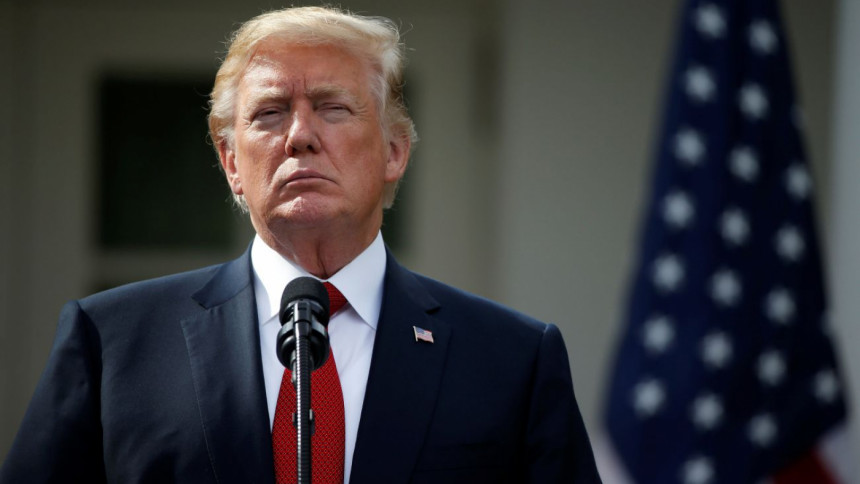The Trump Tamasha

Way back when George W Bush was in the White House, comedian Bill Maher made a wickedly funny observation: How badly do you have to suck to lose a popularity contest to Saddam Hussein?
Maher was referring to polls showing the US public's overwhelming disapproval of the erstwhile US president's disastrous Iraq war, waged on a false pretext of the presence of weapons of mass destruction. Despite widespread loathing for the Iraqi dictator of that time, Americans did not buy their president's argument for going to war. (Outrage was even greater among the global public.)
Well, give the devil its due.
The current incumbent in the White House has gone one better than good old Dubya.
How badly do you have to suck when the American people trust you even less than a thug and fixer who lied to Congress?
That's exactly what has happened after a riveting, if sordid, drama played out in television for the edification of the US public in which Michael Cohen, a former fixer/thug of US President Donald J Trump, called the president a cheat, a conman and a racist.
A recent Quinnipiac poll found that respondents thought Cohen, a disbarred lawyer who pleaded to lying to Congress, was more trustworthy than Trump by a margin of 50 percent to 35 percent.
There's more. The poll showed 65 percent believe Trump is not honest, while 64 percent believe he committed crimes before becoming president (and 45 percent believe he's committed crimes in the White House).
No wonder former US Senate speaker Harry Reid, Democrat of Nevada, sounds positively wistful about George W Bush, with whom he had fought many a bitter political battle. "I miss him every day," Reid said recently. "We had our political differences, but no one ever questioned his patriotism."
Things have come to such a pass that one waxes eloquent about George W Bush, whose dubious historical claim to fame includes two major debacles in recent US history: The Iraq war in foreign policy, and the ghastly management of the aftermath of Hurricane Katrina, from which the storied city of New Orleans has never quite recovered.
The Cohen hearings quickly descended into political fisticuffs with the feel of a WWE professional wrestling brawl, thanks to Republican antagonists' bitter, if unconvincing, tirade against giving a platform to a confessed liar.
What's striking is what Republicans did not do. Not a single one of them defended Trump. Even Trump's staunchest House supporters aren't willing to be a character witness for Trump.
How is all of this going to play out? You have to remember that today's toxic political polarisation has made US national politics viciously tribal. While his Republican Party got a smart kick on its backside in the recent midterm polls, among the party base Trump strides like a colossus, with a whopping 80 to 90 percent approval from Republicans.
Yet, at the same time, Trump's bare-knuckle partisanship is beginning to take a toll. The recent midterm thumping of Republicans has put Democrats back in power in the House, and the Cohen hearings has led to ominously widening House investigations into Trump.
A catastrophic nosedive in support for the Republican Party in America's wealthy suburbs led to their midterm electoral debacle. While it's too early to say how all this will play out in the 2020 presidential elections, one political scientist says it may not matter, because Trump's eventual loss may already be baked in.
"The high levels of hyperpartisanship and polarisation in the electorate have… made the outcome of our elections highly predictable," Rachel Bitecofer wrote recently in the New York Times. A key aspect of this is negative partisanship, she says. Voters are driven more by hatred of the opposition party. This benefits the party that doesn't hold the presidency.
Bitecofer, a professor at the Wason Center for Public Policy at Christopher Newport University in Virginia, used her political model to predict the midterm elections months before other analysts, and her predictions held up well against the very best.
Remember, Trump won by a whisker in 2016, thanks to the antiquated US electoral college system. Candidates win electoral college votes allocated to each state by winning individual states.
The size of the majority in each state does not matter. This led to a bizarre situation where Trump beat Democratic candidate Hillary Clinton despite losing the popular vote by over 2.8 million votes.
How is this possible? Here's an example. While Hillary won the same number of 52 electoral college votes from California despite beating Trump by over 4 million votes, Trump squeaked home to victory by winning the 46 combined electoral college votes of Michigan, Wisconsin and Pennsylvania by whisker-thin majorities. His total majority in all three states combined was 107,000, enough to fit a football field.
This time it's different. "It is not likely he will carry Michigan, Wisconsin and Pennsylvania in 2020," Bitecofer says. Democrats trounced Republicans in these states in the recent midterms.
This gives me some hope at a depressing time when the US political system seems to be in meltdown mode with a hatemongering chronic liar for a president and a Republican Party held in complete thrall with no qualms about enabling him.
But a caveat is in order. Trump has defied analysts before.
I draw hope from the words of a president from a very different Republican Party. "You can fool some of the people all of the time, you can fool all of the people some of the time, but you cannot fool all the people all the time," Abraham Lincoln, America's 16th president, is said to have observed.
Now historians doubt he ever said it. Be that as it may, I hope for the nation's sake that those words are true, whoever said it.
Ashfaque Swapan is a contributing editor for Siliconeer, a monthly periodical for South Asians in the United States.











Comments